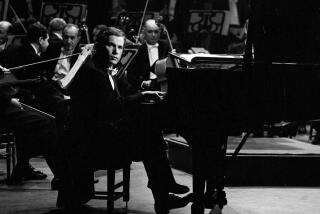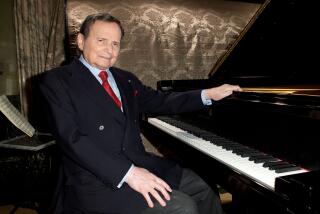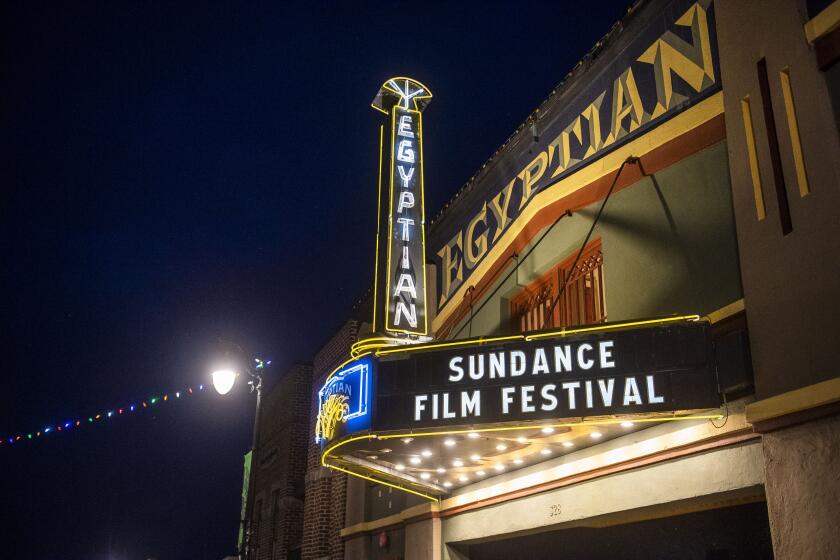Remembering the brilliant, troubled Oscar Levant
He was one of the great wits of the last century — a bestselling author, radio and television host, quiz show panelist, actor and songwriter who became a household name in the 1940s and ’50s.
Oscar Levant, edgy, unhinged and brilliant, was a rumpled, chain-smoking man whose stinging one-liners about showbiz — “strip away the phony tinsel of Hollywood and you’ll find the real tinsel underneath” — and his own foibles would make him a social media star today.
For the record:
11:55 a.m. Aug. 23, 2018This article states that “At Wit’s End” was written by Stan Freeman. It was written by Joel Kimmel. Also, TV host Jack Paar’s last name is misspelled as Parr.
America ate it up. But in his heart, Levant was first and foremost a composer and performer of classical music.
“I don’t want to be known as a wag; I want to be known as a serious musician,” he said, and he had the track record to justify it. His 1945 recording of George Gershwin’s “Rhapsody in Blue” was one of Columbia Records’ top-selling albums, and he was America’s highest-paid classical concert star, outdrawing the likes of Arthur Rubinstein and Vladimir Horowitz.
His celebrity, however, came at a terrible price. Sixty years ago this month, as Levant walked onstage at the Hollywood Bowl for his final concert, he was battling drug addiction, manic depression and stage fright. There were questions about whether he’d be able to finish the performance. Fortified by a backstage injection of Demerol, he got through Gershwin’s “Concerto in F” and won a standing ovation.
He died 14 years later, a 65-year-old recluse in his Beverly Hills home. And the passage of time has taken a toll. While Levant is remembered for his roles in Hollywood musicals such as “An American in Paris” and “The Band Wagon,” his life as a piano virtuoso has been all but forgotten, and most of his classic studio recordings for Columbia have long been out of print. Until now.
This month, Sony Classical is reissuing Levant’s recordings in a handsome, eight-disc box set. “Rhapsody in Blue: The Extraordinary Life of Oscar Levant” features a hardbound book with an illuminating essay by Michael Feinstein — the premier interpreter of the Great American Songbook and a friend of the Levant family — along with photos, handbills, newspaper clippings, studio notes and a discography.
“I’m thrilled to be part of this project because it’s a very rich, unique and important body of work,” said Feinstein. “Oscar’s choice of material and his performances were impeccable and fascinating. He played everything from Bach to Shostakovich, and he played it well.
“But just as important, these recordings capture an era of classical music when every radio network had full-time orchestras that regularly programmed classical literature,” Feinstein added. “It was a time when classic music was heard on the airwaves as much as pop music. For me, it brings back an extraordinary moment of musical multi-culturalism.”
Beyond the Gershwin recordings, the set includes works by modern composers such as Debussy, Ravel, Poulenc, Copland and Albeniz, along with pieces by Beethoven, Wagner, Brahms, Schumann, Chopin and Tchaikovsky. There are also two previously unreleased studio recordings, including a Bach Partita and “Blue Plate Special,” a frenetic, jazz-inflected piece that Levant wrote and recorded in 1947.
For his two surviving children, Amanda Carmel and Lorna Clements, Levant’s re-released recordings are a gratifying reminder of his musical genius. They also prompt thoughts about his legacy and the troubles that haunted their family as his mental condition worsened. (Levant’s wife, June, and his oldest eldest daughter, Marcia, are both deceased.)
“My sister and I agree that the more famous my dad became, with movies and TV and books and appearances, the less his musical gift was known,” said Carmel, who lives in Los Angeles and went on to a career in TV production. “All of that other stuff eclipsed the thing he really cared about, the gift that really made him who he was.”
Clements, who lives in upstate New York and worked in public relations at Julliard, said the box set recalls the many hours her father would spend at his piano, behind closed doors in the den of their North Roxbury Drive home. When he was preparing for a concert, he grew pressured and tense, and his behavior became unpredictable.
“We always knew when his practice was coming to an end,” she said. “We’d be playing in the house after school and the signal that the practice session was ending was when he hit the last notes of the Chopin Etude in C Sharp Minor. We’d run for cover when we heard it.”
The family was often walking on eggshells, she added, but there was also tenderness and love: “He was a very sensitive person, for all his problems. He once sent me a copy of the score to Parsifal, and wrote in the inscription, ‘For Lorna, the jewel in my diadem. Love, Daddy.’ ”
The child of Russian Jewish immigrants, Levant was born in Pittsburgh in 1906 and showed unusual prowess on the piano at a young age. He later moved to New York where, at his mother’s insistence, he studied with respected classical teachers. But he was soon swept up in the fast lane of New York City life in the 1920s, immersing himself in pop music, Broadway and Jazz. He became fast friends with Gershwin, performing his friend’s works tirelessly, and was devastated by the composer’s 1937 death from a brain tumor.
Somehow, amid the din of his hectic life in New York and Hollywood, Levant managed to pursue a career in classical music composition, performance and recording. He studied with composer Arnold Schoenberg in the 1930s at UCLA and wrote several highly praised works, including a piano concerto and string quartets. In the years after Gershwin’s death, he became a master interpreter of his works.
But America knew him best as a wisecracking TV and movie celebrity, and his arduous work schedule nearly killed him. Levant suffered a massive heart attack in 1952 and it shattered his confidence, plunging him into a downward spiral of depression and addiction to painkillers.
Most celebrities, conscious of their images, would have lowered their public profile. But Levant charged into the final chapter of his life as a confessional trailblazer, a man who spoke freely and outrageously about his deteriorating mental state on live television. “There is a fine line between genius and insanity,” he said. “I have erased that line.”
He made memorably jarring appearances on the “Tonight Show” with Jack Parr and hosted his own TV show in Los Angeles in the late 1950s, until his caustic outbursts and riffs on mental illness became too much for sponsors. In a 2006 retrospective, National Public Radio called Levant “America’s first publicly dysfunctional celebrity.”
“Oscar was a loose cannon,” Feinstein said. “But he was always himself at a time when, especially on television, it was all about artifice. Celebrities didn’t talk as honestly about themselves as he did. He was fascinating, and you couldn’t take your eyes off him. You never knew what he was going to say. It was that sense of danger and of truthfulness that has always made him so unique.”
Levant’s mystique continues to fascinate. Besides “A Talent for Genius: The Life and Times of Oscar Levant,” a 1994 biography by Sam Kashner and Nancy Schoenberger, several plays have been written about him, including “At Wit’s End” by Stan Freeman and “For Piano and Harpo” by Dan Castellaneta, chronicling Levant’s friendship with Harpo Marx.
Now, a third show is on the way. Pulitzer and Tony-winning playwright Doug Wright is working on a play about Levant with “Will and Grace” star Sean Hayes. While they’re mum on details, both believe audiences are ready for another look at a man whose gifts were forever at war with his demons. And they may be right. The public showed time and again, to the bitter end, that they loved this man and his music.
In the months before his final concert at the Hollywood Bowl in 1958, for example, Levant had been in and out of Los Angeles psychiatric wards. It was all over the newspapers, but his condition was not a source of shame. Just before his encore, he shouted to the crowd: “I’m playing under the auspices of Mount Sinai!” They erupted in cheers.
More to Read
Only good movies
Get the Indie Focus newsletter, Mark Olsen's weekly guide to the world of cinema.
You may occasionally receive promotional content from the Los Angeles Times.






